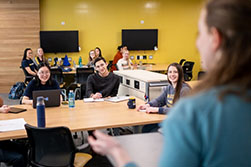The unfolding events in Ferguson, Missouri, are unquestionably on many students' minds--as they are on faculty's--as they go about their daily lives on campus. The civil unrest in Ferguson is a topic, like many other current events, about which people hold widely divergent and deeply-felt perspectives, often connected in powerful ways to their own identities. Even if you don't teach content related to such issues, unfolding current events are affecting your students' experiences of learning and being on campus. Given how polarizing such topics can be, how can you foster engaged dialogue among students that are meaningful and productive of learning?

CRLT's website features guidelines for discussing difficult topics to support teachers in facilitating such conversations in classrooms across the curriculum. If you want to raise such topics in your classroom in order to explore connections between course material and contemporary events, here are some strategies for planned discussions of high-stakes topics. Other CRLT resources offer you ways to prepare for and respond to challenging conversations that emerge when you haven’t planned for them.
Some strategies highlighted on these pages--useful for either planned or spontaneous discussions--include:
- Create a framework for the discussion, using specific questions to guide student contributions.
- Allow everyone a chance to contribute, but don't force students to participate in the discussion. Consider letting students write briefly about the topic to gather their thoughts individually before sharing or to provide a way to contribute ideas anonymously.
- Consider supportive ways to open and close such a discussion. You might begin by explaining the goals and relevance of the discussion to your class and explicitly welcoming a range of perspectives. To close a discussion, you can thank students for their contributions and indicate ways they can continue to explore the topics.
- Where possible, discuss links to the content of your course or discipline. Even in settings where you immediately see a connection to your topics, this is likely to be affecting your students and their ability to focus on your class. Acknowledging this can be a powerful way to facilitate their learning.

Whether you choose to address such issues head-on in a similar way, or you just want to respond productively if students raise sensitive topics, it's helpful to plan ahead. In addition to our online resources, CRLT consultants are available to consult with individual instructors about effective ways to raise or respond to high-stakes conversations in your classrooms. You can request an appointment online or call us at 734-764-0505 for just-in-time consultations about emerging issues in your classes.
Thumbnail photo credit: Brett Myers on Flickr.
- Log in to post comments
- 58 views






